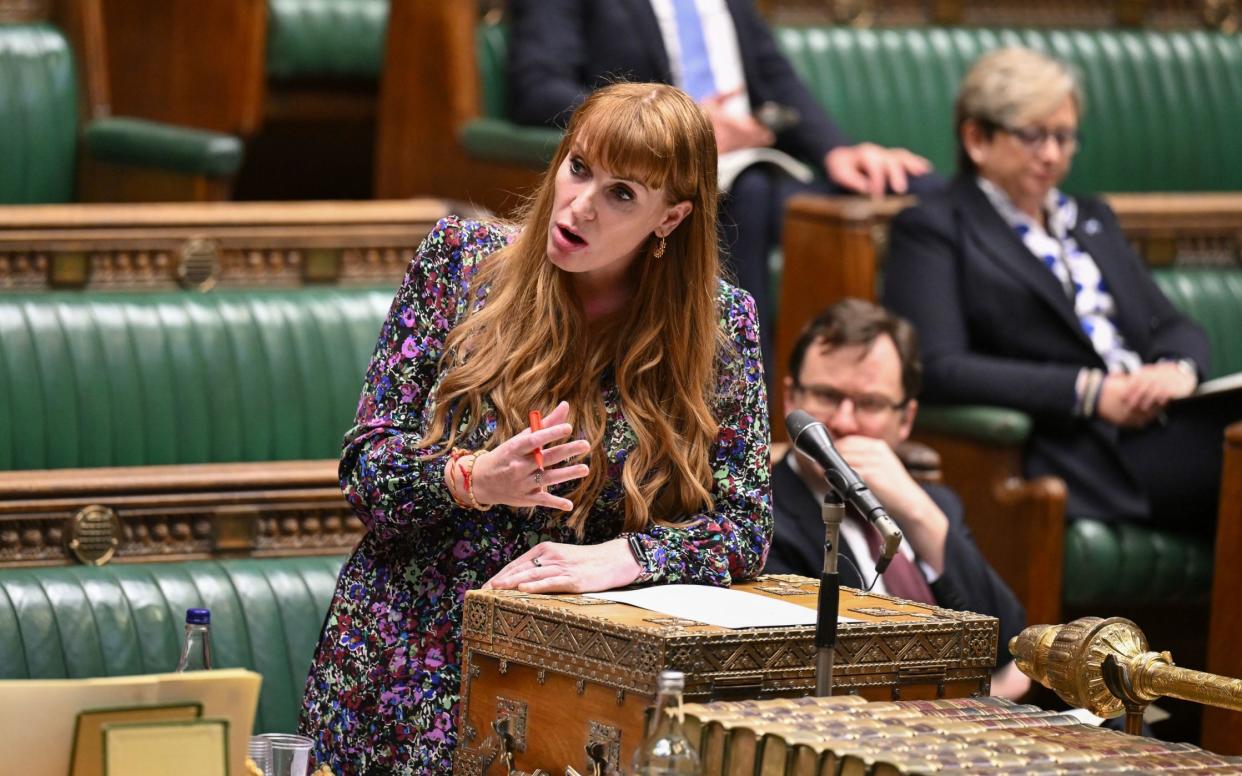Angela Rayner was against the all-women shortlist that led to her election

Angela Rayner was opposed to the all-women shortlist that led to her election, a new book has revealed.
The deputy Labour leader, who entered the Commons in 2015 as the MP for Ashton-under-Lyne, said she would have preferred to compete against both male and female contenders for the Labour nomination.
But despite her local party having unanimously voted for an ‘open’ list for both male and female candidates, it was overruled by Labour’s National Executive Committee in London.
A new biography of the 43-year-old by Lord Ashcroft, the Tory peer and author, recalled her criticising the all-women shortlist system in 2019 during a talk at Oldham Sixth Form College.
Ms Rayner is said to have told students: “When I was going to be a Member of Parliament, I didn’t want to stand in an all-women shortlist. I wanted to stand on an open list.
“I’m as good as any bloke, and I’ve proved that since... I should have been selected years before I was selected. I had to get selected on an all-women shortlist.
“I’m more successful than a majority of the men that are in Parliament, but I had to prove I was even better than them, like miles ahead of them. That’s not fair. That’s not equality.”
Labour have reportedly dropped all-female candidate lists
Ms Rayner was one of 31 Labour MPs elected from all-women shortlists at the 2015 general election, when a further 46 all-women shortlists were drawn up.
Twenty-eight Labour MPs from all-women shortlists were elected in 2010, while 35 out of 38 candidates from all-women shortlists became MPs as part of Sir Tony Blair’s 1997 landslide.
A majority of the Labour parliamentary party is now female, which has led Sir Keir Starmer’s team to reportedly drop female-only candidate lists for the next general election.
Speaking at Labour’s annual party conference in 2016, Ms Rayner said “it took just 183 years and an all-women’s shortlist” for her to become the first female elected as the MP for Ashton-under-Lyme.
“We have more work to do right across the country to get more female Labour MPs, more female Labour councillors and even more female Labour Mayors,” she told activists at the time.
Lord Ashcroft’s book about Ms Rayner, titled Red Queen? The Unauthorised Biography of Angela Rayner, sparked a row in recent weeks about whether she should have been liable for capital gains after selling her home in Stockport in 2015, leading to accusations of providing false information about her living circumstances.
The frontbencher, who is also Labour’s shadow housing secretary and shadow deputy prime minister, has denied wrongdoing and insisted she “lived there, paid the bills there and was registered to vote there” right up until she sold the property.
Speaking at a press gallery lunch in Westminster, she insisted there “was no capital gains tax to pay” and revealed that she spent eight months in intensive care with her baby son.
‘It was slightly OTT, but it was just Angela’
Lord Ashcroft’s book collates a number of interviews with Ms Rayner in which she admitted she “honestly didn’t know what a trade union was” when she became a Unison shop steward in the early 2000s.
It also reveals she shared a Facebook post in 2015 to mark the 10th anniversary of the ban on hunting with dogs which showed a fox running past Downing Street with a speech bubble coming out of its mouth that read ‘cull the Tories!’
The biography goes on to recall the furore in September 2021 when Ms Rayner described senior Tories as “scum” during a fringe event at the Labour conference in Brighton. She apologised the following month and said she would be “more careful” in the language she chose to use.
Andrew Mitchell, a Foreign Office minister, is quoted as saying the comment “was slightly OTT, but it was just Angela”.
“It wasn’t in my view an offensive comment, which it could easily have been coming from someone else,” he said. “You might say that’s patronising, but what little I knew of her at the time suggested that any such comment, in spite of the word used, was not meant to be venomous.”


